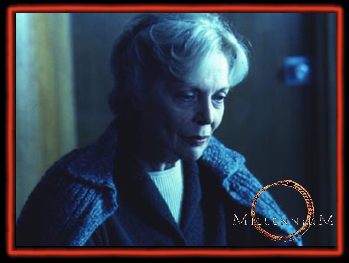

 Directed by Arthur Forney. Written by Erin Maher and
Kay Reindl.
Directed by Arthur Forney. Written by Erin Maher and
Kay Reindl.
EPISODE RATING: (1 to 4) **
Long since retired FBI agent Michael Lanyard commits suicide with his old bureau issue firearm, and leaves behind a note that reads "It must end". Frank and agents Hollis and Baldwin investigate the death, but Baldwin doesn't think it's worth their time. Frank, however, suspects there is something more at work than an lonely old man killing himself, especially as the last person to visit Lanyard was Peter Watts. Going through Lanyard's old files, Frank begins to unravel the late agents final case; in 1945, Lanyard (Dean Winters) was assigned to investigate a brutal homicide on the Los Alamos military base, where nuclear testing was being done. The victim was one of the bases scientists, and Lanyard discovers some startling truths about the death and what his being done about it.
'Matryoshka' is an episode that has the potential to be a real hall-of-famer, but ends up dropping the ball...like Carter and company did too frequently in the third season. There's real promise in the scenario and setting, but the script just can't fulfil expectations.
One of the elements that makes the show so potentially interesting is the casting. Dean Winters is something of a favorite of mine over the last three years or so, thanks to his fantastic work as the evil yet oddly likable Ryan O'Reilly on the astounding HBO series Oz. Plus he appeared as nice cop Cassidy on the first year of Law & Order: Special Victims Unit, which I also like. Winters previously appeared in the wonderful second season Millennium show 'The Curse Of Frank Black'. Alas, Winters talent and noir-ish hero look isn't much supported by the script, which doesn't give him much in the way of juicy material, although he does have one good scene with J. Edgar Hoover during the flashbacks.
The elderly Lanyard seen in the pre-credits is played by another Millennium veteran. Wally Dalton played one of the four demons in the brilliant second season episode 'Somehow, Satan Got Behind Me'. It's a wordless performance, and yet a very effective one. Dalton's angst and sadness (which is explained later in the show) comes across extremely well. Good cameo.
Another key player in the show is Lily Unser, the mysterious woman who was at the Los Alamos base during the original investigation, and has links to the Millennium Group. The aged character is played by Barbara Bain, the semi-legendary TV actress remembered for Space 1999 and Mission: Impossible. Bain is a fine performer, and does a good job, although some of her dialogue is a little too hokey in places.
The direction is sturdier than the script here. Some of the flashback scenes are well done, moody and well shot. There's nothing too gruesome or violent here, and the subtlety is welcome. There's a slick, film noir style to the 40s sequences...although that's pretty much what you'd expect anyway. The overuse of 1940s period songs becomes rather tiresome, and it also comes across as a lazy way to tie our emotions in with the events onscreen. They should have left it alone after the pre-credits sequence.
The investigation (two, counting Franks) revolves around who killed the scientist. It's a fairly interesting scenario, but when we get to the revelation of what's responsible, we get the rug pulled from under us. With the creation of the Atomic bomb as the background, we're given a killed who is essentially a nuclear-created Jeckyl and Hyde, revealed in one scene that doesn't really make sense. It's creepy, for the first few seconds (think of the flashes of Lucy Butler's demonic alter ego), but as the scene progresses, it falls apart.
The Millennium Group's involvement is rather dull. It's logical how they're involved, but not much more than that. In addition, there's some information about The Group that just isn't convincing, and, I think perhaps goes against what we've been told in the past. On the upside, Watts is made to be more sympathetic by his association to the case, and that's always a good thing.
' Matryoshka' has some merits, but just misses too many targets and ends up as another what-could-have-been entry in the wheezy third season.